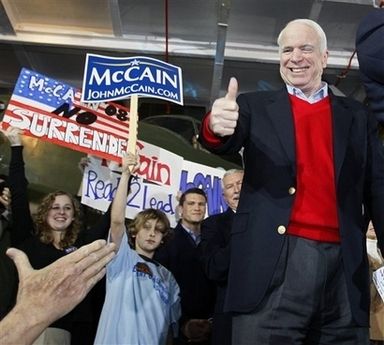SC may set future for GOP candidates
Updated: 2008-01-19 21:57
Washington -- Voters in two US states a continent apart were choosing Saturday among Republican and Democratic candidates for president in contests shadowed by racial politics and the threat of recession.
|
|
No front-runner had emerged in either party as South Carolina's Republicans headed for the polls and Nevadans of both parties prepared for the novelty of caucuses.
Polls in South Carolina opened Saturday at 7 am with many areas seeing rain coming down. A poll manager in Mount Pleasant said it would be difficult to predict what the inclement weather would do to voter turnout. In the northern reaches of the state up to three inches of snow was forecast, which threatened to slow the region to a crawl.
"My friends, these are challenging times," John McCain told supporters Friday while aboard a World War II aircraft carrier in Charleston's harbor. He was referring to the slumping economy, but he could have been talking about the intensity and the expense of the neck-and-neck fight for the GOP nomination.
To the East, Republicans battled for delegates in South Carolina, home of 6.6 percent unemployment in December after the largest one-month increase in nearly 20 years. Political viability was at stake for McCain, Mike Huckabee and Fred Thompson; Mitt Romney, meanwhile, lowered expectations for his prospects in the Palmetto State by moving on to Nevada.
To the West, candidates of both parties braced for caucuses in Nevada that for Democrats have been mired in legal disputes and exchanges about race. The uncertainty stemmed in large part from earlier-than-usual voting in the nation's fastest-growing state.
Hillary Rodham Clinton and John Edwards ganged up on Barack Obama in the final days, mocking his evocation of Ronald Reagan in an effort to offset Obama's endorsement by the powerful Culinary Workers Union. Obama was thought to benefit from special caucus rules that Clinton supporters tried but failed to overturn in federal court.
Altogether, the contests would determine a hefty delegate haul — 25 Democratic, 58 Republican — and kick off a sprint through the South to Florida.
Before then, South Carolina Democrats — many of whom are black — will chose a nominee on Jan. 26.
For both parties, Florida's voters go to the polls on Jan. 29. Former New York Mayor Rudy Giuliani has focused virtually all of his efforts on the state.
Still ahead for those who remain is "Mega Tuesday," Feb. 5, when two dozen states cast what could be deciding votes for the presidential nominees.
|
|
|
||
|
||
|
|
|
|
